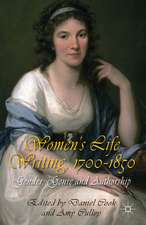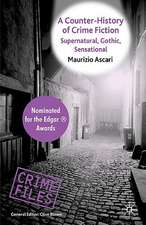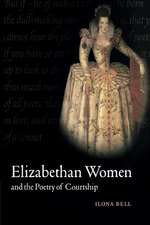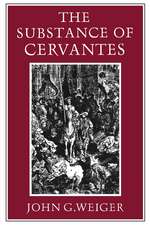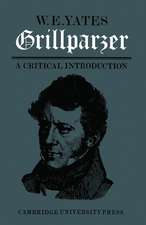British Women's Life Writing, 1760-1840: Friendship, Community, and Collaboration
Autor A. Culleyen Limba Engleză Hardback – 22 iul 2014
| Toate formatele și edițiile | Preț | Express |
|---|---|---|
| Paperback (1) | 384.31 lei 6-8 săpt. | |
| Palgrave Macmillan UK – 2014 | 384.31 lei 6-8 săpt. | |
| Hardback (1) | 390.63 lei 6-8 săpt. | |
| Palgrave Macmillan UK – 22 iul 2014 | 390.63 lei 6-8 săpt. |
Preț: 390.63 lei
Nou
Puncte Express: 586
Preț estimativ în valută:
74.76€ • 77.95$ • 62.13£
74.76€ • 77.95$ • 62.13£
Carte tipărită la comandă
Livrare economică 20 martie-03 aprilie
Preluare comenzi: 021 569.72.76
Specificații
ISBN-13: 9781137274212
ISBN-10: 1137274212
Pagini: 270
Ilustrații: VIII, 270 p.
Dimensiuni: 140 x 216 x 23 mm
Greutate: 0.48 kg
Ediția:2014
Editura: Palgrave Macmillan UK
Colecția Palgrave Macmillan
Locul publicării:London, United Kingdom
ISBN-10: 1137274212
Pagini: 270
Ilustrații: VIII, 270 p.
Dimensiuni: 140 x 216 x 23 mm
Greutate: 0.48 kg
Ediția:2014
Editura: Palgrave Macmillan UK
Colecția Palgrave Macmillan
Locul publicării:London, United Kingdom
Cuprins
Acknowledgements Introduction PART I: 'THEIR LIVES SPOKE MORE THAN VOLUMES' THE LIFE WRITING OF EARLY METHODIST WOMEN 1. The Life Writing of Early Methodist Women 2. 'All the Family in Heaven and Earth are Married': Mary Fletcher and the Family of Methodism 3. 'With Magdalene at the Masters Feet': Testimony and Transcription in the Life of Sarah Ryan 4. 'The Staff of My Old Age': Memorialising Sarah Lawrence 5. 'They Live Yea They Live Forever': Mary Tooth's Methodist History PART II: 'SIGNED WITH HER OWN HAND' THE LIFE WRITING OF LATE EIGHTEENTH-CENTURY AND REGENCY COURTESANS 6. The Life Writing of Late Eighteenth-Century and Regency Courtesans 7. Female Friendship in the Auto/biography of Sophia Baddeley and Elizabeth Steele 8. The Literary Family and the 'Aristocracy of Genius' in the Memoirs of Mary Robinson 9. 'Such is the Sad Trials Left for the Surviver': the Journal of Elizabeth Fox 10. A Life in Opposition: the Memoirs of Harriette Wilson PART III: 'HEARD IN THE SIGHS OF GENERAL MOURNING' THE LIFE WRITING OF BRITISH WOMEN AND THE FRENCH REVOLUTION 11. The Life Writing of British Women and the French Revolution 12. 'The Good Will Remain Written in Brass': Helen Maria Williams' Collective Memories 13. 'The Little Hero of Each Tale': Mary Wollstonecraft's Travelogue and Revolutionary Auto/biography 14. A Vindication of Self and Other: the Journal of Grace Dalrymple Elliott 15. To 'Rally Round the Throne': Saving the Nation in Charlotte West's Residence Bibliography Index
Recenzii
“In her study ofwomen’s life writing in manuscript and in print, Amy Culley persuasively arguesfor a rethinking of the theory and practice of self- representation in the lateeighteenth and early nineteenth centuries. … Engaging throughout with existingscholarship, this is an innovative and incisive study which significantlyadvances our understanding of women’s life writing.” (Anna M. Fitzer, SharpNews, Vol. 24 (4), 2015)
"This book productively deploys the more capacious conceptual model of life-writing to take account of the diverse ways in which women narrated their lives, through print and manuscript, emphasising themes of community, textual sociability and generational interaction. There is no book that applies the methodology of 'life- writing studies' to 18th and 19th century women in this way. Thebook has a number of interdisciplinary strengths, appealing to scholars in history, gender studies, literary studies, French Revolution studies, celebrity studies and life writing studies." Elizabeth Eger, Kings College London, UK
"Life writing has fresh theory, which Culley uses thoughtfully and imaginatively in tandem with scholarship on 18th-century lives, letters, journals and travel writing... With all its case studies, the book makes a convincing case for seeing women's life writing as outward-looking, even if its insistence on relationality raises an unfashionable question: did none of these women ever shut the door and breathe a sigh of relief that on paper they could be or invent themselves? The egalitarianism of life writing has been very beneficial to literary studies, and Culley's sympathetic readings show how. I wonder, though, whether the updating of models of relationships from circles to social networks projects our own remodelling of relationships in social media: this is the LinkedIn version of self. No wonder it's persuasive." Clare Brant, Times Higher Education
"A carefully constructed and warm-hearted study... Culley believes the women she has studied were intending something very different: creating a communal memory, a collective history, blurring genres of biography and autobiography and of aural record and literary text. For them, life writing was not about individual expression, but the recording of communal experience for the benefit of posterity." Kate Chisholm, Times Literary Supplement
"This book productively deploys the more capacious conceptual model of life-writing to take account of the diverse ways in which women narrated their lives, through print and manuscript, emphasising themes of community, textual sociability and generational interaction. There is no book that applies the methodology of 'life- writing studies' to 18th and 19th century women in this way. Thebook has a number of interdisciplinary strengths, appealing to scholars in history, gender studies, literary studies, French Revolution studies, celebrity studies and life writing studies." Elizabeth Eger, Kings College London, UK
"Life writing has fresh theory, which Culley uses thoughtfully and imaginatively in tandem with scholarship on 18th-century lives, letters, journals and travel writing... With all its case studies, the book makes a convincing case for seeing women's life writing as outward-looking, even if its insistence on relationality raises an unfashionable question: did none of these women ever shut the door and breathe a sigh of relief that on paper they could be or invent themselves? The egalitarianism of life writing has been very beneficial to literary studies, and Culley's sympathetic readings show how. I wonder, though, whether the updating of models of relationships from circles to social networks projects our own remodelling of relationships in social media: this is the LinkedIn version of self. No wonder it's persuasive." Clare Brant, Times Higher Education
"A carefully constructed and warm-hearted study... Culley believes the women she has studied were intending something very different: creating a communal memory, a collective history, blurring genres of biography and autobiography and of aural record and literary text. For them, life writing was not about individual expression, but the recording of communal experience for the benefit of posterity." Kate Chisholm, Times Literary Supplement
Notă biografică
Amy Culley is a Senior Lecturer in English at the University of Lincoln, UK. She has published essays on women's life writing in the eighteenth century and Romantic period. She is the editor of volumes 1-4 of Women's Court and Society Memoirs (2009) and co-editor of Women's Life Writing, 1700-1850: Gender, Genre and Authorship (2012).





